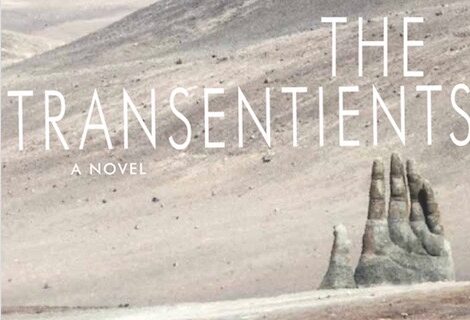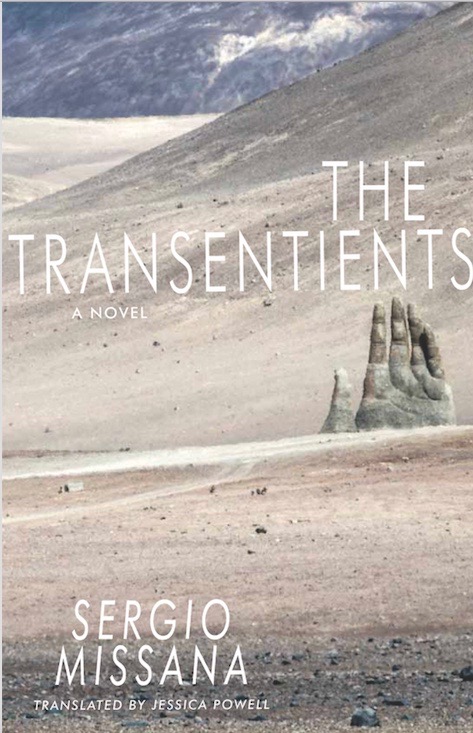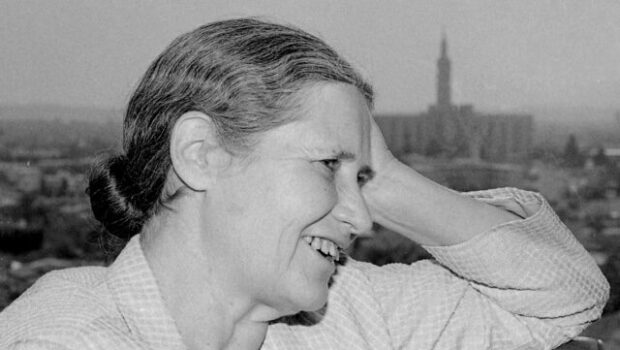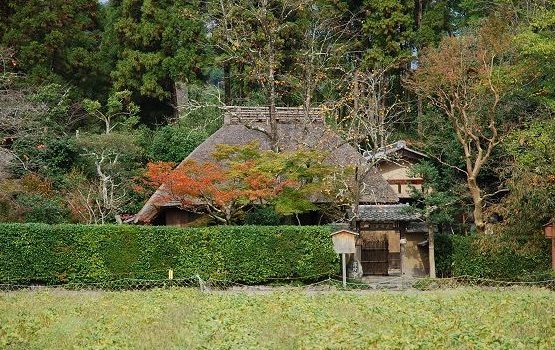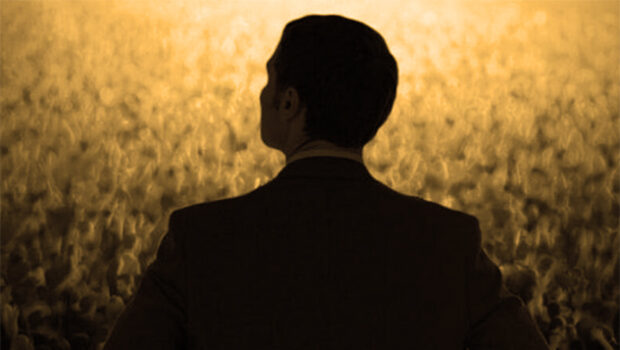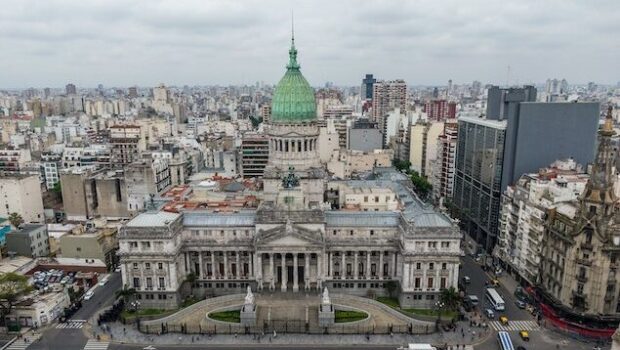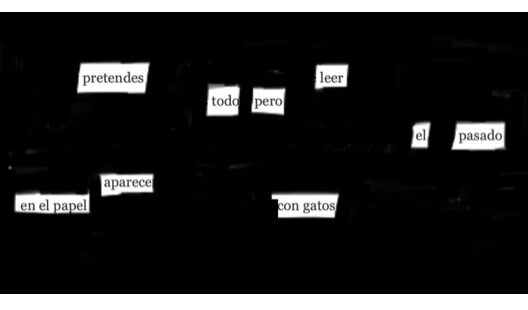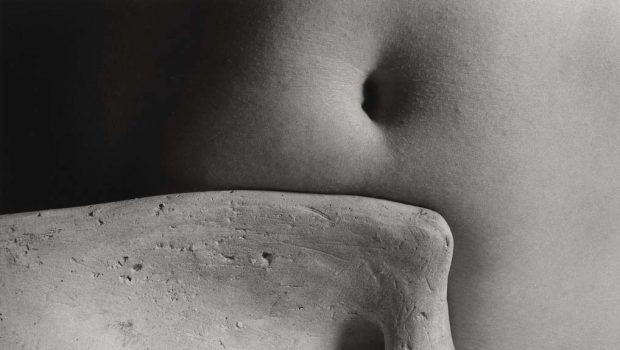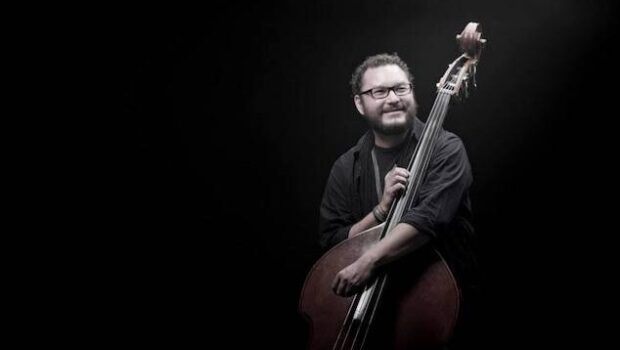The Transentients
Sergio Missana
We descend laboriously down the lee side of the ridge, battered ceaselessly by the wind. The gale beats at our clothing as if we were in a free fall, instead of picking our way cautiously, testing the consistency of packed snow and strips of ice beneath the clouds of snow swirling around our legs. Ramiro shouts something that I can’t make out. He points to the top of the ridge, some five meters above our heads, and we continue to descend. In the flat, meager light, the crests of sharp rock are the only indication of the arête. The bare spikes of rock jut out into the blizzard like a branch piercing the surface of a torrential flood: the snow forms horizontal sheets and tentacles that extend out above us, giving us an idea, against the dark storm clouds hovering higher up, of the wind pattern. Aside from that, I can’t make out a thing except Ramiro’s silhouette moving a few meters below me, and I try to step where he’s stepped. It’s only in relation to him that I can tell where the slope tilts.
Ramiro stops. He appears to be trying to get his bearings in the middle of the blinding whiteout. The wind changes direction and a white gust whips viciously up from the depths of the gorge. Ramiro squats down, hunched against the stab of cold. I do the same, turning my back to him. The gust passes, followed by a moment of relative calm. We stay like that for a few minutes, catching our breath. The snow accumulates around us. I look up at the stretch we’ve just descended and see that, beyond ten or fifteen feet out, the storm has erased our tracks. I’m about to speak, but Ramiro appears to have read my mind and nods. We’ll leave a flag further down, where it’s narrower, he shouts. Okay, I shout. Ramiro closes his eyes and remains in place for a long moment. At last he stands up and we start moving down the slope, which has become more precipitous. I would have preferred not to rest. I feel weak and a little dizzy, I’m thirsty, blood pulses in my temples. My numb feet send pain signals that seem to be coming from somewhere beyond my legs, as though I’m touching sensitive spots in the snow each time I bury my crampons in the scarp.
We’re cutting across the slope on a diagonal, which forces us into the wind in certain stretches. With its incessant whistling, I can’t hear the hollow thud of the crampons, or the clinking of metal gear or my own breathing. Though we’re thigh-deep in the snow, I see Ramiro making footholds in the deepest sections, which I use to trace his trajectory. The snow stuck to our clothing freezes, forming an armor that cracks at the joints with each stride. The coil of rope I’m carrying over one shoulder is now a solid hoop. We peer out over what appears to be the edge of a cliff. The edge begins to collapse beneath our weight, but Ramiro doesn’t react. He sees that I’ve stopped a few feet above him and he gives me a thumb’s up. Don’t worry. We’re right on track. Then he stretches out his arms and drops down the slope.
We come to a place where the undulating crest of the ridge doubles back on itself, creating a kind of bowl, at the base of which the terrain flattens out, forming a narrow shelf before plummeting over a precipice. This is the place Ramiro has been looking for. A wave of energy seems to come over him. He signals for me to wait at the base and I see him climb skillfully up to the top of the bowl, burying the toes of his crampons in thin crusts of dirty ice adhered to the rock, clinging to cracks and outcroppings invisible to me from below. He makes it to a swath of snow and stabs the handle of his ice axe just beneath the arête. The snow is hard and he struggles to place the axe. A shroud of fog or powdered snow rises up between us and, from one moment to the next, I lose sight of him. I’m overcome with panic. I’m about to scream, but the veil recedes and he’s there in front of me, less than a hundred feet straight ahead. For the first time in a long while I think of Osvaldo and I’m flooded by a wave of shame and remorse. Osvaldo is alone higher up, in who knows what condition, searching blindly for us in the storm, provided he still has the strength to walk. Ramiro manages to set the ice axe. Now he takes something out of his backpack. A dark-colored article of clothing. A fleece or a long-sleeved t-shirt. He ties it to the ice axe to make a flag that flaps madly in the wind. He gives me another thumb’s up and starts to descend, skirting around the top of the hollow bowl. The force of the wind tips the ice axe and the t-shirt tears apart. Only a small piece remains stuck to the handle. Ramiro continues to descend, not realizing what’s happened until he’s halfway down. I signal for him to turn around and look up. He makes it back to the ice axe, our signal for Osvaldo. He couldn’t possibly reach this spot, even in the middle of the night, without coming across that small serrated cross or our tent at the base of the bowl. Ramiro sets the ice axe again, in the hard-packed snow a few feet higher up, and leaves it there, with the shred of fabric waving furiously in the wind. He descends to where I’m waiting. He’s exhausted. I ask if he wants to rest and he shakes his head.
We dig out a flat area in the most sheltered spot on the shelf. I hold the tent down with my hands and feet while Ramiro works to set it up. We pound in the stakes and Ramiro runs a rope in a zigzag over the top to further secure it against the wind. We crawl inside. I take the lantern out of my backpack. I take my mittens off so I can light it. But I can’t do it. My hands are shaking, as is the rest of my body. My head throbs like a second heart. Ramiro tells me to take off my parka and snow pants and get into my sleeping bag in my clothes. I do so, groping about in the dark. Ramiro lights the lantern. I see him rummage around in his backpack. Then he unzips the tent and reaches an arm out to fill the receptacle on the portable stove with snow. He lights the stove. Do you want coffee or soup? Coffee, I answer. He holds out a piece of chocolate. No, thanks. Eat it, huevón, he says. Small drops of blood collect in the cracks of his pale, chapped lips. I obey. I have to chew the frozen chocolate with my molars. I ask Ramiro if we should stay awake in shifts to wait for my brother and he tells me it’s not worth it. We have to try to recuperate our strength for tomorrow. Most likely, Osvaldo decided to make the descent. If that’s the case, he’ll turn up here in a couple of hours. Three, at the most. It’s also possible he found a sheltered spot on the rock wall and decided to spend the night up top. The storm’s bound to let up tomorrow, and we’ll go up and look for him. I shrug. I lie back. I close my eyes and am asleep in seconds.
I wake up just before dawn. I prop up on one elbow and know immediately that Osvaldo is not in the tent. I can make out the bulky shape of Ramiro’s sleeping bag and the measured rhythm of his breathing. The storm is still raging. The wind howls, shaking the tent as though we were sailing it through violent ocean swells. A muted light filters through the nylon dome with a phosphorescent glow. The snow assaults the walls of the tent in an incessant drumbeat that makes me think of an attack by living beings, insects, and piles up around our heads nearly halfway up the tent. I linger for a long while, studying the tracks of condensation on the tent fabric, slowly emerging from the deep trance of sleep. Encased in the double cocoon of my sleeping bag and the tent, I think again of Osvaldo, seeing his smiling face during one stretch of our ascent the previous morning. For the first time, I’m aware that he could be dying or dead.
I need to go to the bathroom. I lie there another twenty minutes so as not to wake Ramiro. He jolts awake at my first slight movement. He looks at me for a moment and lies back down, turning his back to me. I’m going out to piss, I say. He doesn’t answer. I pull on my snow pants, boots, helmet and parka. I debate whether to strap on my crampons and decide against it. I go out. I have to lean over, lowering my center of gravity like a rugby player bracing against a tackle so the wind doesn’t knock me over. The vertical snow stabs the few exposed centimeters of my face like needles. I adjust my balaclava, goggles and mittens. Visibility is near zero. The tent appears to be resting, half-buried, in a white universe without features or dimensions. There’s no separation between the snow and the sky. I can’t see the sharp ridge of the mountain or the small stone bowl that we chose as our point of reference or Ramiro’s ice axe or the plunging abyss a few meters behind me. I’m afraid that, in stepping even a few feet away from the tent, it too will disappear into the whiteness and I won’t be able to find it again. It takes an enormous effort to move forward over the horizontal terrain without my crampons. I move the bare minimum distance away, tracing what I believe is a route parallel to the cliff edge, never taking my eyes off the tent, which shrinks to a vague orange blur through a curtain of white powder. I kneel in the snow, my back to the wind, and urinate. I retrace my steps. The color of the tent regains its brightness. I’ve almost made it back when I slip on a patch of ice beneath the white powder. Instinctively, I rear upwards, stretching my arms out to catch my balance, and the wind hits me full in the back, lifting me off the ground as if I’d just jumped on a trampoline, pushing me toward the cliff. I close my eyes. To my surprise, I don’t continue sailing into the void, but instead fall on something solid, winding up buried in three feet of snow. I get up carefully. I clear my goggles and try to make out the edge of the cliff. I imagine I could touch it by just stretching out my hands. But I’m not sure of my orientation. I can’t see the tent. Snow has filtered through the top of my parka and the neck and back of my t-shirt are soaked. I move straight into the wind, nearly dragging myself, feeling along the terrain with my mittens. The tent materializes before me. I fall inside, panting, without shaking off the snow covering my feet and head.
We wait for Osvaldo. I ask Ramiro if we should try to look for him and he tells me it would be impossible. We’d only manage to make things worse. His only hope is to come across the tent in the middle of the snowstorm. And soon. We both know — and there’s no need for Ramiro to say it out loud — that his chances of survival grow smaller with each passing minute. And there’s nothing for us to do but wait. The storm shows no sign of letting up. Through the constant wail of wind and hammering snow against the still-exposed parts of the tent, we can clearly hear the muffled rumble of avalanches in the gorge. Avalanches are not a concern in this area or at the base of the rock wall where Osvaldo must be, though there could be ice slides, and the crumbling snow will surely make our descent from here difficult. We organize the tent. We try to dry the puddles of water from the snow I tracked in after my fall. We roll up our sleeping bags. Ramiro comments, with no apparent emotion, that we have enough fuel and food (coffee with sugar, soup, cereal, raisins and chocolate) for three or four days, more if we don’t find Osvaldo. Ramiro methodically organizes and takes inventory of the climbing gear: bolts, pitons, nuts, carabiners, belay devices, rappelling hooks, helmets, harnesses, hammers, shovels and ropes. He does this with a maniacal meticulousness. When he finishes, his face suddenly contorts in a wail. He covers his face with his hands and gets himself under control so as not to burst out sobbing. Without looking at me, he picks up the portable stove’s receptacle and unzips the tent to fill it with snow. He melts it over the stove. We drink coffee. We wait.
At regular intervals, Ramiro turns on his cellphone to check the time and then turns it off again to save the battery. There’s no signal up here. Long stretches of silence elapse. Ramiro keeps me apprised of the time. We do not mention Osvaldo. At one point I remind him that, on the first day of our ascent, we’d crossed paths with a team of mule-drivers, and surely they’d alerted someone. When the weather improves, I say, they’ll launch a rescue operation immediately. Ramiro nods and we fall silent again. He sits motionless, his forearms on his knees, his head tilted forward so as not to touch the roof of the tent, his gaze fixed on a spot on the back wall, outside of which the snow has accumulated, forming a protective hollow. Everything in his manner demands that I respect that ominous silence, which only heightens my temptation to talk incessantly, to assuage my anxiety with a torrent of words. I’m aware that we’re sitting as far apart as the dimensions of the tent allow. Continuous waves of animosity flow between us. I tell myself that it’s a result of our confinement and circumstances, and I try hard not to take it personally. But the truth is that, as must also be happening for him, as the hours pass, his company is becoming unbearable. The slightest provocation and I’d be on him with my ice axe or pocketknife. I find his tacit condescension about my inexperience as a climber particularly irritating.
It was Osvaldo’s idea for me to come with them on this training expedition and it was obvious from the start that Ramiro was annoyed by my presence, just another burden to haul up the mountain. But it’s also true that this climb didn’t involve the least bit of technical difficulty, except for the vertical faces sheathed in ice at the top of this section, which I wasn’t going to even attempt to climb. Further, my lack of skill is relative and only in relation to my brother’s. Though it’s an irrefutable truth that everything I know about mountaineering I’ve absorbed indirectly through Osvaldo, it’s no less true that I’ve spent more hours on the mountain than many supposed enthusiasts. Mountaineering has been Osvaldo’s great obsession for the past ten years, the central driving force in his life. He dedicates the least possible amount of time and effort to work, and even to his marriage, to be able to take off for the mountains whenever the opportunity arises. In contrast, I’ve kept a safe distance. I’ve allowed myself to be drawn in by its gravitational force, but always retained, I tell myself, a degree of control. Osvaldo confessed that one day, in the middle of a particularly difficult climb, he had a revelation. He understood that mountain climbing was a type of training, that he was developing and refining faculties for a different purpose, for something else, though he didn’t know for what. Ramiro and Osvaldo met in Concepción, in their first year studying biology, and bonded over their compulsive passion for the mountains. They were inseparable at the university. Now they rarely see one another, except when they go on climbs, which they have less and less time for, especially since the birth of Jonás, my nephew. Once, Osvaldo told me that Ramiro had gotten angry with him over it, saying they didn’t spend time together like in the old days, that they only got together to go climbing. Osvaldo shared with me that, after several weeks in the mountains with Ramiro — whom he loved like a second brother — the last thing that would have occurred to him was to spend more time with him. And that was even without his wife Gabi’s recriminations. Deep down, he told me, aside from the mountaineering, they no longer had very much in common. More and more, Osvaldo had chosen to climb solo.
Even so, I wasn’t surprised by the news that Osvaldo had decided after all to join Ramiro — a hardier, more seasoned climber than he was — on his most ambitious climb to date: Cerro Torre, one of Patagonia’s majestic granite cathedrals, among the world’s most difficult mountains to climb. The idea, explained Osvaldo, was to follow the most beautiful and classic route, established by Jim Bridwell in 1979, the upper half of which coincided with the route taken on Cesare Maestri’s first ascent, in 1970, in which he’d used a compressor to more quickly drill bolts into the rock. They planned to camp on the glacier — practically at the base of the gigantic stone spire — for five weeks, from the middle of December until the end of January, where they would wait for a window of good weather during which to attempt the ascent. They would try to make it to the summit, crowned by an ice cap, and descend again within a week, more than twice as long as the record Bridwell and Steve Brewer had set. This excursion, at the beginning of April, was to be the first in a series of training climbs. The plan had been to climb in one day to the base of the escarpment, some three hundred meters above the place where we were now waiting, and to set up camp there so Ramiro and Osvaldo could do their practice ascents on the rock, with and without ice. According to Ramiro, the ice there more or less reproduced the conditions on the lower section of Cerro Torre, where Bridwell had gone off-route along an ice fissure and where, in 1959, the Austrian Toni Egger had plummeted into the void during his first attempted ascent, plunging into the snow covering the glacier, where he was found sixteen years later.
We arrived Friday, after dark, at the site at the base of the rock wall, from which a constant rain of rocks and ice shards was falling. We couldn’t find a spot sheltered from the wind. Ramiro mentioned this place, a relatively protected bowl where we should set up our tent in case the weather got worse. The weather report predicted unstable conditions: wind and some snow. Osvaldo and Ramiro agreed that this matched the conditions they could expect to encounter on Cerro Torre on the mildest days (with ninety mile an hour gusts at the summit) and they decided to assume the “calculated risk.” I was going to stay at basecamp the entire time — the ascent up the rock wall exceeded my capabilities — and my presence there would improve the security of our camp. We got equipment ready in case we had to descend in the snow. Ramiro said he’d studied an alternate route down in case of bad weather. But nothing had prepared us for the storm that, suddenly and with uncommon fury, descended upon us.
Yesterday, as dawn broke, at Ramiro’s insistence, the first thing we did was break camp. Osvaldo suggested they do a few short climbs and return here by mid-afternoon to set up a second, more sheltered camp. There was a strong wind, but the sky looked clear, except for a few high, scattered clouds. We had breakfast. Osvaldo was the first to ascend. Ramiro and I sat on a flat rock and watched him climb nimbly up the vertical wall of the escarpment, following an established route which, according to Ramiro, didn’t present much in the way of technical difficulty. About a hundred feet up, he stopped to rest beneath an overhang formed by a jutting section of rock. We saw him squat down and pull gently on the rope to test its resistance and then attack the overhang, using miniscule hand and footholds. When he pulled himself up over the splintered rim, we lost sight of him. He reappeared fifteen minutes later, much higher up, shifting over to the right in order to avoid a spur. He moved carefully. He came to a dark colored seam, turned and waved to us. He motioned for Ramiro to follow him. Ramiro shook his head. Osvaldo started the ascent of the final pitch, climbing diagonally along that darker seam. Within a few minutes, he’d reached the target: a thin cornice on the near-vertical face. After hooking into his protection, he sat on the shelf, his feet dangling over the edge into thin air. He signaled again for Ramiro to ascend. Ramiro, in turn, gestured for Osvaldo to descend first. With a gesture of irritation, he stood up, patted me on the back in farewell and started up the wall. Twenty minutes later, he was sitting next to Osvaldo on the shelf. They stayed up there a long time, gazing at the panorama unfolding before them.
They started moving again, continuing to ascend, much to my surprise. Osvaldo waved at me and I waved back. I saw them climb up to a small obelisk of brown rock and continue toward its summit, cutting across the escarpment to the south. Ramiro was leading. The wall must have undulated, as I lost sight of them in certain sections. From below, it looked as if they had merged with the rock, only to reassume, momentarily, their human shape. Until they stopped reappearing altogether.
The wind started to blow harder. To warm myself up, I did a few short descents and ascents along a north-facing ravine. But I spent most of the time watching the mountain. As the hours passed and still no sign of them, I began to feel anxious. The cold was deepening, but I didn’t want to leave my observation post. Big clouds gathered around the summit of the mountains and within the space of a few minutes covered the entire sky. Details on the escarpment disappeared, transforming it into a single, gray, monolithic mass. A new layer of clouds, dark and turbulent, hurtled against the rock face, covering it almost completely. It started to snow. A dense curtain of horizontal flakes imposed itself between my observation post and the rock. I couldn’t think of anything better to do than stay put, my gaze fixed on the last spot on their route that I could still see, where hangers and carabiners clinked against the rock.
Finally, past four in the afternoon, I glimpsed what I had been waiting for hours to see: the end of a rope dangling down from the dense mass of fog. In a few minutes, Ramiro’s floating silhouette issued out of the clouds. He landed with a dry thump on the snow and stood motionless for a moment, his back to me. He unclipped from the rappel rope. I waited for him to yank on the rope or to step away, but he didn’t do anything. I understood that he was alone. He turned around to look at me. His face was contorted. He said a few disjointed sentences. I took him by the shoulders to question him. Apparently, at a certain point, Osvaldo had suggested doing a few short solo climbs. Ramiro had said they should go down since the wind was blowing too hard, but Osvaldo was determined to do one more route, the last one. Osvaldo headed up a wall without an established route. They’d been apart for about fifteen minutes when the weather turned. A cloud of fog surrounded them and it started to hail. Ramiro expected Osvaldo to return any minute so they could begin the descent — in these conditions, much more dangerous than the ascent had been — but he didn’t return. He waited ten more minutes and then climbed up the wall. The ascent was very difficult; the rock had become slippery, visibility was nil, and, he said, it felt every minute like the wind was going to rip him from the wall. At a certain point, the anchors stopped. Based on what he’d been able to see from the bottom, Ramiro had the impression that, over to the right, across a concave area that, because of its architecture and poor rock quality, would have been arduous even under normal conditions, there was a series of cracks and crevasses where one could take shelter. It was possible that Osvaldo had headed there to wait out the hailstorm. Or that he’d continued climbing without anchors. Or taken an unpredictable route. He explained to me — or at least this was how I chose to interpret it — that, if Osvaldo had fallen, he would have come down very near the place he’d set up to wait for him. Ramiro told me that he stayed there, clinging to the rock, being battered by the storm, for a long time, maybe half an hour, not knowing what to do, unable to bring himself to abandon Osvaldo, until his arms started shaking from cold and fatigue.
By the time Ramiro arrived at the base of the escarpment, I was numb with cold. Ramiro fell to his knees, exhausted, determined to wait there for Osvaldo to return. The end of the rappel rope twisted in the wind like a serpent. For a long while, that twisting movement made me think that Osvaldo had hooked on to the rope and we’d soon see him emerge from the clouds, just as, to an inexpert eye, the drag of current in a river against a fishing line might look like the agonizing tugs of a fish. I told Ramiro that I was freezing and asked him if we could go down to the place he’d chosen to set up camp, but he refused. We’ll wait here, he ruled. He closed his eyes and remained still, kneeling in the snow, for more than an hour. I jumped up and down on that platform exposed to the wind and snow, careful not to get too close to the edge, where a constant, fine rain of stones pelted down from the overhang, forming a sort of protective fence, like a ring of asteroids. I strapped on my crampons and climbed up and down the ravine several times, opening and closing my hands inside my mittens. The cold boring into my bones prevented me from thinking clearly about Osvaldo, kept me from any concern other than the necessity of getting warm, drinking a cup of coffee. The snow began to accumulate on Ramiro’s back, shoulders and helmet. He remained as motionless as a statue. He had fallen asleep. I approached him. I raised a hand to touch his shoulder. Just before contact, he opened his eyes and looked at me, unsurprised. We have to wait, he said, he could come down any minute. We waited until the light began to fade and the formless, depthless white began to turn to an equally uniform gray. Ramiro stood, put on his crampons and walked over to the rope. He yanked on it a few times to be sure it was firmly attached. He remained there for a moment, staring at the point where the thin violet line was devoured by the clouds, and he seemed to be fighting the temptation to climb back up the rock. At last, he released the rope and we began our descent.
Ramiro turns on his cellphone. He notes the time without the least hint of emotion. He turns the phone off. Four o’clock, he tells me, not looking up. I realize with total clarity something that, immersed in my own anxiety, I hadn’t registered before: Ramiro is in shock, paralyzed, defenseless. I lie on my side in my sleeping bag and curl up my legs, trying to impose the greatest possible distance between me and his personal space. I think, with a stab of anguish that I try hard to keep at bay, that Osvaldo has been missing for over twenty-four hours.
I stand up. I unzip the tent to refill the basin of the cook stove. The snow has accumulated on this side halfway up the zipper. I have to use my shovel to see outside. Visibility has not improved at all. The tent seems to be floating in the center of a maelstrom, a primordial chaos, a confusion of molecules in frenetic turmoil. I return to my spot inside the tent and become aware, for the first time, of the stench emanating from our sleeping bags and clothes. Within a few minutes, I’ve grown used to it again. It’s melded back into the warmth, and I no longer notice it. The confinement makes me think of a childhood game. I remember that Osvaldo and I used to climb up onto a bed or an armchair, which we’d designated as a spaceship or a boat, and it was us against the unknown, against everything outside of that boundary. We had countless adventures, launched endless attacks — in which he, as the older brother, always played the role of the hero — combatting cannibals or rescuing princesses or unearthing treasures, but always, the best part was being enclosed inside the ship, the constant and familiar in the midst of the unknown and uncharted, that niche of belonging.
We eat dried fruit, chocolate and granola bars. I make coffee with sugar. I comment that coffee isn’t the best thing for hydration and Ramiro doesn’t answer. I’m overwhelmed by a sense of loathing and I have to restrain myself from insulting him. I want to scream at him: React, huevón, we have to help Osvaldo and make it out of this alive. Instead, I tell him to lie down for a while and to try to get some sleep. To my surprise, he listens to me. He closes his eyes and falls into a deep sleep. Even in the strange orange dusk that reigns inside this nylon capsule, his face looks very pale. His helplessness makes me feel doubly at the mercy of our circumstances, as if the encircling barrier between us and the storm were closing in on us. I hear, over the howl of the wind, the distant rumble of an avalanche. I have the impression that the ground beneath the snow, the entire mountain, shakes a little. I melt more snow and let it cool. I set about carefully pushing away the snow that’s accumulating outside the tent, warping the fabric and threatening to tear it. The storm shows no sign of letting up.
Ramiro sleeps for more than an hour. When he wakes up he looks a little bit replenished. He goes out to urinate and returns after a few minutes. He tells me, as he’s unstrapping his crampons, that visibility is still terrible. I suggest that we climb, roped together, to the base of the escarpment and he says that, in these conditions, it wouldn’t be feasible. We drink the water and Ramiro melts more snow. He comments, abstractedly, that we need to start rationing fuel. When he finishes, he stretches out on his back in his sleeping bag. With one finger, he traces runnels of moisture in the film of condensation that covers the tent fabric. I get ready to go out to pee, strapping on my crampons. I put on my parka and helmet. I go out. The storm hasn’t let up at all. I grab onto the rope reinforcing the tent so I don’t lose my balance. The rope has become as stiff as a steel cable. With its convulsive movements, the half-buried tent makes me think of a living organ, a beating heart in the middle of a white tapestry. I don’t have to pee, but I needed to get out of that confinement for a few minutes. In an almost physical way, the wind clears my head, sweeping away my anxiety and fear and even my antipathy toward Ramiro, leaving my mind momentarily empty. A small certainty lodges itself in the center of my consciousness. A subtle, yet clear and irrefutable signal. Osvaldo is alive. I even think I see him for a moment: lodged in a cleft in the rock, badly injured, using every shred of willpower in order not to fall asleep. This state of clarity passes. Thoughts clutter my mind again, coming one after another, disordered and contradictory, fighting for dominance. But the certainty remains. I’m about to go back inside the tent, from which I’ve not moved a single step, so I can tell Ramiro. I pause. What will I say to him? That I’ve just had a vision, a hunch?
While one part of me — the place where that certainty resides? — observes me with indifference or disapproval, I move away from the tent and head toward the base of the bowl, navigating the gusting wind. After a few unsteady steps, I look back and can no longer see the tent, and I feel like a person who’s just jumped ship in the middle of the ocean. I’m not sure about my decision and I struggle to stick with it. Why had I been given that knowledge if not to do something about it? I have to find Osvaldo. I’m moving blindly, impelled by a sense of duty that’s gradually becoming untethered from its own content. I calculate that I’ve walked thirty or forty feet and I still haven’t come to the base of the bowl. I tell myself that I’ll know it by a change in the strength or sound of the wind. It’s possible that I calculated the orientation of the tent incorrectly and that I’m now walking parallel to the edge of the cliff somewhere off to my left. A wave of vertigo washes through me. I correct course. With each step, my legs sink in the snow up to my thighs, but I don’t lose my footing. I struggle, not against the physical obstacles, but against the unsteadiness of my conviction. One part of me knows that this is not a good idea. Ramiro said it: climbing up to the escarpment — is that what I’ve set out to do, or am I just searching blindly for my brother? — is not feasible. I don’t care that this excursion doesn’t make sense. What matters is that I adjust it or align it to my vision and, especially, to the certainty that came over me a short time ago and that remains inside me like a guiding light.
I make it to the base of the bowl, near its steepest side, and a severe slope rises before me. I can still go back, I tell myself. This is the border beyond which it will become improbable that I could find the tent again. I think that I should have brought rescue equipment. I have no ropes and no food, or even my ice axe, but I can still help him get down. It was also a mistake not to have told Ramiro of my intentions — Ramiro must be wondering where I am by now — but if I’d told him, he wouldn’t have let me leave. I stay here for a minute, catching my breath after a strenuous horizontal traverse of no more than a hundred and fifty feet. The wind and snow batter me in furious, painful blasts. I can’t abandon Osvaldo, I decide. With my second step, my crampon hits something hard buried in the snow and I almost fall. I grope around. It’s Ramiro’s ice axe. It must have been dislodged by the wind from its place at the top of the bowl and fallen down here. Is it possible that Osvaldo could have descended, skirting the slope, without seeing the tent? I don’t think so. In my vision (or imagination) I thought I saw him lodged in a fissure. If he had made it to the base of the escarpment, he would surely have found us. I start walking.
I advance up that first slope, nearly dragging myself, opening a furrow with my head and shoulders through more than three feet of powder. My crampons slip on the rock of the bowl and, every two or three steps, I slide downhill, undoing my progress. This exasperating task takes me at least half an hour. When I finally make it to the top, the wind batters me with redoubled violence. The snow whipping along is so dense that I catch nothing but mere glimpses of light gray within what looks like a torrent of white foam. I keep moving, leaning into the wind like a drunk against a friend, trying to bear most of my weight on my fully outstretched left leg. Although I can’t see it, I’m sure I’m moving along the protected flank, just beneath the ridge, retracing the route I’d descended with Ramiro yesterday. Having oriented myself in the blinding storm gives me a strange feeling of exultation or euphoria. Here, the snow is more substantial and I progress, albeit slowly, at a regular, sure pace. With each step, the distance between me and Osvaldo shrinks by half a meter. The clarity of purpose I hadn’t been able to summon a few minutes before now coalesces into a physical tenacity, into the concrete effort of climbing the mountain. This step, this breath.
The light begins to fade and I’m able to glean a vague idea, amid the volleys of snow, of the general contours of the terrain. At one point, in a fleeting window of visibility, I make out a serrated fin of rock marking the edge of the ridge, somewhat higher up than I had calculated. I lose sight of it. I correct course. As I approach the summit, I enter a turbulent zone in which the wind seems to be blowing in all directions at the same time, but turns out to be less intense. The wind whistles a single, piercing note as it whips over the edge of the ridge. For a few minutes, as the light fades, I have the impression that what light remains is emanating from the snow itself. Then, all at once, it’s dark. Everything around me is tinged an opaque, uniform gray. I keep climbing. Suddenly, circling under a rock jutting out from the side of the mountain, my left boot fails to find purchase and I fall. I slide downward into a ravine. My back hits something hard, a rocky outcrop, which stops my slide. I realize I’m no longer holding Ramiro’s ice axe. I do my best to shake out the snow that’s gotten past my waistband and into the hood of my parka. I climb, following the furrow made by my body, so as not to lose my bearings. I find the ice axe. I ascend back up to the rock. I climb around to the left and continue skirting the arête.
I come to a slope ridged with intermittent bands of ice. The ice is extremely hard in these sections and my crampons barely nick their surface. In the sections between the ice, I sink to my waist in snow. When I do finally make it to the other edge of the slope, I fall to my knees, exhausted. With every breath, I can feel the entire internal structure of my lungs, as though each bronchiole were filling with a burning liquid. I tell myself that I should stand up and keep moving, but my legs won’t obey. I’m too tired. In the few minutes I’ve been crouched down here — two, three at the most? — the cold has permeated me. I can feel it advancing from my feet and hands, which have gone numb. I’m covered in a shroud of snow. I have to muster every last shred of willpower to get up. With both hands braced on the ice axe, I push myself to my feet. I become aware that the terrain has almost leveled off. Maybe I’ve already made it to the base of the escarpment. I advance, shaking violently with cold, trying to rid myself of it, toward where I ought to find the rock wall and the rappel rope Osvaldo can use to descend. But I don’t come to the wall. The slope here pitches downward, and a little to the left. I cut over to the right, but the slope sinks away here too. I have no other choice than to keep moving, as I did below, near the tent, directly into the wind. After twenty paces, the slope begins to ascend once again. I understand that I’ve come back to the ridge, that I need to keep climbing. I pause to catch my breath. I stand there, my mittened hands braced on my knees. I let out what I recognize as a sob, not of desperation or fear, but of fatigue. My body’s giving out. And I can’t shake the cold. I feel it gaining ground, centimeter by centimeter, moving up my legs and arms, seizing my back. I grit my teeth and keep climbing.
Every step is utter agony. I can’t keep going. At any moment my strength will give out, I think, unalarmed, one of my cramping legs will refuse to take the next step. But I continue up the mountain. An irresistible urge to sleep comes over me. I could dig a small niche in the snow and lie down for a little while. Just a few minutes would be enough to regain my energy, I tell myself, and waves of pleasure wash through me at the mere prospect of rest. But I know that I wouldn’t wake up again. During one stretch, I close my eyes (visibility is so bad that it hardly makes any difference) and I see Osvaldo. He’s in a bathing suit, standing on a rock at the edge of a swimming pool. He’s ten years old. His hands are on his waist. I watch him from the water. He smiles, backlit by the sun. Then he plunges in. I open my eyes. We’ll be together again, I tell myself. Once again, I sense his presence higher up on the mountain, like a signal, and I note, moved, that the certainty that brought me this far is still with me. He’s not dead, I think, he’s not dead. My stiff mouth tries to say it out loud. He’s not dead. But there’s not much time. I have to find Osvaldo and guide him back to the tent. Before it’s too late, before the storm closes in on him like reality does for all dead people. Suddenly, surprisingly, I’m climbing more easily. Not with renewed energy, but with a sensation of lightness, as though my body had found a way of avoiding its own misery — the cramps, the stabbing pain in my lungs, the numb absence of my feet and hands, the dead weight of cold anchored to my shoulders, the nausea, the sleepiness — and is moving, in part, through another dimension. Images of Osvaldo pass before me, one after another. Also the photo of a newborn baby. Our older brother, Simón, who died at two weeks old from a respiratory infection. They’d taken him to the same hospital where he’d been born and he never came out again. I also remember how our mother avoided talking about him or would put an end to the subject, declaring that, if it hadn’t been for his death, I never would have come into the world. I remember reading somewhere that many people are conceived as twins and that, in the majority of cases, only one of the fetuses ends up being viable and the other one is reabsorbed, transformed into a sort of internal twin. I don’t know if this is true. Simón would be my internal twin, dead so that I could live. I struggle to remember my mother’s young face, but what materializes before me is the image of Gabi, in Valdivia, on the day of her marriage to Osvaldo. And then the weekend when I paid them a surprise visit and they got into a shouting match about, as usual, a climbing trip. And later, Gabi’s silhouette in the darkness, leaning over the sofa where I was sleeping and how, still half-asleep, it took me a few seconds to realize that she was naked.
I keep going. The slope grows steeper but it no longer has much to do with me. In the images floating before me, I begin to notice slight incongruities and I understand that I’m nodding off for brief moments as I climb. I move in and out of sleep like a swimmer keeping himself afloat by means of his own forward momentum. And these brief immersions give me the strength to keep going just a little bit further. In one of these fragmentary, fleeting and disjointed dreams, I experience the illusion of being or having been someone else. I’m sitting in the dark, in an armchair in an unfamiliar room, facing a window pelted by rain. I’m holding a bottle of beer. A cat glides lazily across the parquet floor. I wake up. I think of Osvaldo again and his presence higher up the mountain merges with the memory of Simón. I have the impression that he’s walking somewhere off to my right, very close by, on the other side of a wall that makes him invisible and that this wall is eroding, losing solidity, until it’s reduced to a thin membrane which, in turn, disintegrates into the sheets of snow driven on the wind.
*Chapter 6 from The Transentients
Spanish text copyright © 2010 by Sergio Missana
Translation copyright © 2021 by Jessica Powell
All rights reserved.
Published by McPherson & Company
www.mcphersonco.com
Posted: February 20, 2022 at 10:35 pm


